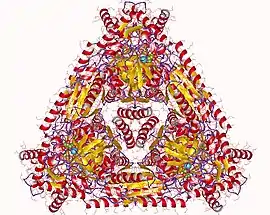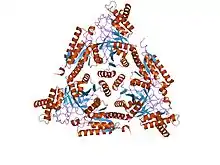| L-arabinose isomerase | |||||||||
|---|---|---|---|---|---|---|---|---|---|
 L-arabinose isomerase hexamer, Geobacillus kaustophilus | |||||||||
| Identifiers | |||||||||
| EC no. | 5.3.1.4 | ||||||||
| CAS no. | 9023-80-7 | ||||||||
| Databases | |||||||||
| IntEnz | IntEnz view | ||||||||
| BRENDA | BRENDA entry | ||||||||
| ExPASy | NiceZyme view | ||||||||
| KEGG | KEGG entry | ||||||||
| MetaCyc | metabolic pathway | ||||||||
| PRIAM | profile | ||||||||
| PDB structures | RCSB PDB PDBe PDBsum | ||||||||
| Gene Ontology | AmiGO / QuickGO | ||||||||
| |||||||||
| Arabinose isomerase | |||||||||
|---|---|---|---|---|---|---|---|---|---|
 crystal structure of l-arabinose isomerase from e.coli | |||||||||
| Identifiers | |||||||||
| Symbol | Arabinose_Isome | ||||||||
| Pfam | PF02610 | ||||||||
| InterPro | IPR003762 | ||||||||
| |||||||||
In enzymology, a L-arabinose isomerase (EC 5.3.1.4) is an enzyme that catalyzes the chemical reaction
- L-arabinose L-ribulose
Hence, this enzyme has one substrate, L-arabinose, and one product, L-ribulose.
This enzyme belongs to the family of isomerases, specifically those intramolecular oxidoreductases interconverting aldoses and ketoses. The systematic name of this enzyme class is L-arabinose aldose-ketose-isomerase. This enzyme participates in pentose and glucuronate interconversions.
This enzyme catalyses the conversion of L-arabinose to L-ribulose as the first step in the pathway of L-arabinose utilization as a carbon source.[1]
Structural studies
As of late 2007, two structures have been solved for this class of enzymes, with PDB accession codes 2AJT and 2HXG.
References
- ↑ Sa-Nogueira I, Nogueira TV, Soares S, de Lencastre H (March 1997). "The Bacillus subtilis L-arabinose (ara) operon: nucleotide sequence, genetic organization and expression". Microbiology. 143 (3): 957–69. doi:10.1099/00221287-143-3-957. PMID 9084180.
Further reading
- HEATH EC, HORECKER BL, SMYRNIOTIS PZ, TAKAGI Y (1958). "Pentose fermentation by Lactobacillus plantarum. II. L-arabinose isomerase". J. Biol. Chem. 231 (2): 1031–7. doi:10.1016/S0021-9258(18)70464-X. PMID 13539034.
- Nakamatu T, Yamanaka K (1969). "Crystallization and properties of L-arabinose isomerase from Lactobacillus gayonii". Biochim. Biophys. Acta. 178 (1): 156–65. doi:10.1016/0005-2744(69)90142-9. PMID 5773448.
This article is issued from Wikipedia. The text is licensed under Creative Commons - Attribution - Sharealike. Additional terms may apply for the media files.